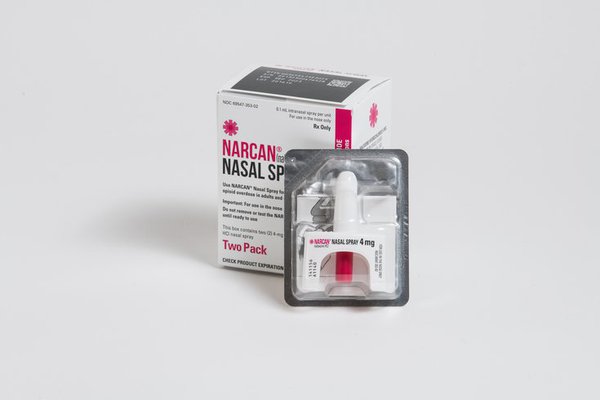Starting next week, the drug-overdose antidote Narcan will be available for purchase over the counter at major retailers across the United States.
The 4 mg naloxone nasal spray, which can reverse the physical effects of opioids and prevent overdose deaths, will be available at grocery stores, pharmacies and through online retailers, Narcan manufacturer Emergent BioSolutions announced in a press release on Wednesday. The suggested retail price for a two-dose pack of Narcan is $44.99.
- READ MORE:
- Pa. senators consider bill to involuntarily commit people, who overdose and are revived, to addiction treatment centers
- Fentanyl seizures surge in Pennsylvania as the synthetic opioid displaces heroin, A.G. report says
- Over-the-counter Narcan to be available by late summer, manufacturer says
The U.S. Food and Drug Administration first approved the over-the-counter sale of naloxone nasal spray this March. Previously, the drug was technically only available by prescription, but standing orders in most U.S. states have allowed pharmacists to sell it to customers without a proper prescription. Now, the lifesaving drug will be widely available at stores like Walmart, CVS, Walgreens and Rite Aid.
"I think that seeing Narcan on drugstore shelves alongside other medications will help reduce stigma towards people who use drugs and their loved ones," said Shawn Westfahl, an overdose prevention and harm reduction coordinator at the Kensington-based public health nonprofit Prevention Point Philadelphia. "It is an absolutely crucial tool to save lives as overdoses continue to rise nationally, and in Philadelphia."
Naloxone can also be administered intravenously, which is still an option that’s available with a prescription. In 2017, naloxone nasal spray was found to be just as effective as the injectable version of the drug in a study published in the journal Addiction.
For many opioid users, the medication has quite literally been a lifesaver. When administered correctly and quickly enough, naloxone can reduce or reverse the effects of drugs like heroin, fentanyl and prescription painkillers like oxycodone. These drugs impact the part of the brain that controls breathing and, when taken in excessive doses, can cause a person to stop breathing and die. Naloxone blocks the physical effects of these drugs and can reverse the reduction in breathing that can occur during an overdose, often saving the person's life.
Nationwide, drug overdose deaths have more than doubled over the last 10 years, with over 106,000 Americans dying from an overdose in 2021, according to data compiled by the National Institute on Drug Abuse. Last year, provisional data showed that just over 105,000 people died from drug overdoses in the U.S., a slight decline amidst an otherwise grim trend.
Philadelphia has been a notorious hotspot for the opioid crisis. In 2010, the city saw 387 unintentional overdose deaths. By 2021, that number had ballooned to 1,276. Over time, those overdoses have increasingly involved fentanyl, the dangerously potent synthetic opioid that has found its way into the city’s drug supply.
The drug problem in Philadelphia, most notably in Kensington, has garnered international attention. A New York Times Magazine cover story described the neighborhood as “the largest open-air narcotics market for heroin on the East Coast,” and the London-based Daily Mail referred to Kensington as “Zombieland” in a piece chronicling the neighborhood’s widespread opioid use.
As Philly's drug epidemic has grown, so too have efforts to minimize the harm it causes. PPP, which uses harm reduction to combat the adverse effects of poverty and drug abuse, has seen a growing demand for Narcan. In its last fiscal year, PPP distributed 95,644 doses of Narcan — a three-fold increase over the previous year — a spokesperson for the organization told PhillyVoice. The nonprofit also said it has given 1,300 free overdose prevention trainings to members of the community.
In February 2022, Philly became the first city in the country to deploy a kiosk that dispenses free kits of naloxone. The kiosk was erected outside Lucien E. Blackwell West Philadelphia Regional Library. In 2020, the Philadelphia Department of Public Health partnered with harm reduction organizations to make naloxone available to city residents for free by mail.
Even as naloxone usage has grown, access to the lifesaving treatment remains a challenge for many. Last year, a study from Penn State found that while the drug was often readily available in Philadelphia, in some Pennsylvania counties it was much harder to come by. In rural Clinton County, Narcan was only available 41% of the time it was needed, compared to 92% in Philadelphia.
With Narcan coming to more retail store shelves in the Philadelphia region and beyond, public health advocates are hopeful that the wider availability will help stem the tide of increasingly troubling trends and headlines.
"It is very important to lower barriers to accessing Narcan, including geographical and financial barriers," said Westfahl. "The overdose epidemic affects every county in the country. Narcan must be affordable and accessible to all."


